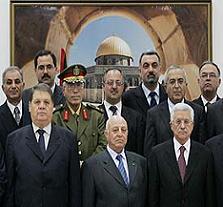
The Palestinian Legislative Council, comprising 88 MPs, made its voice heard loudly and clearly in Thursday’s parliamentary session. No more reshuffling of ministers, no more old guard domination and most of all, hopefully, no more corruption. In a vote of confidence, virtually without opposition, the PLC members ratified the proposed cabinet by a margin of 54 yes to 10 no votes, with 2 abstentions. The cabinet consists of 24 ministers, of which three quarters are newly appointed. They have neither held ministerial positions nor are they part of the legislative council. This cabinet, with all the good that it brings, has a very tough job ahead dealing with internal and external hindrances accompanied by a very short time schedule, before the Palestinian people once again go to the polls, this time electing their legislators.
The approval for the new cabinet did not come easy for the Palestinian Prime Minister, Ahmad Qorei (aka Abu Alaa). In a show of true democracy, with much give and take, the legislative council progressively applied the pressure on the PM, forcing him time and time again to overhaul his proposed list, until finally the PLC by a resounding majority vote decided to accept the final proposal by the PM. It included competent, technocratic and relatively young professionals. The new cabinet reads as follows:
- Nasser Yousef - Interior Minister
- Salam Fayad - Finance Minister
- Nasser Al-Kidwa - Foreign Minister
- Nabil Shaath - Deputy Prime Minister and Information Minister
- Naim Abul Homous - Education Minister
- Mohammad Dahlan - Civil Affairs Minister
- Zahira Kamal - Woman Affaris Minister
- Ghassan Khatib - Minister of Planning
- Hassan Abu Libdeh - Labour and Social Affaris Minister
- Yehiyah Yakhlouf - Culture Minister
- Sufian Abu Zaydeh - Prisoner Affairs Minister
- Walid Abed Rabbo - Agriculture Minister
- Sabri Saidam - Communication and Technology Minister
- Zohni Al-Waheidi - Health Minister
- Khaled Qawasmeh - Local Affairs Minister
- Mohammad Istayeh - Housing and Public Works Minister
- Mazen Sinokrot - Economic Affairs Minister
- Ziad Bandak - Tourisim Minister
- Saad-Eddine Khurrma - Transportation Minister
- Farid Jalad - Justice Minister
- Saher Bseiso - Youth and Sports Minister
- Ahmad Majdalani - Minister without portfolio
- Yousef Salameh - Religious Affairs Minister
- Hind Khoury Minister without portfolio
- Samir Hleileh Secretary-General of the Cabinet
Like many previous governments this government will have no easy tasks. It will have to face the same obstacles that many governments before have faced. These obstacles include both internal and external challenges.
The main internal challenges haven’t changed. They still include curbing corruption, nepotism and cronyism. The first major step towards curbing this problem, which is a remnant of the old guard, has already been taken by exchanging personnel. However, the challenge does not stop here; this new cabinet will have to take on the endeavors of nation- building, institution-building, transparency, and most of all the challenge of first economic relief as part of a comprehensive economic development plan. These measures might sound superficial and even repetitive at first glance; however, they are still in dire need of an effective implementation mechanism.
Then there is the lingering and long overdue problem of dealing with the difficult Sharon government. Just yesterday the new Palestinian government was greeted with another instant crisis, yet again a suicide bombing that struck the heart of Israel. Every suicide bombing is of course inherently bad as well as badly timed. Since the declared ceasefire by the Palestinian and Israeli leaders in Sharm el-Sheikh, violence on both sides has in fact only decreased cosmetically. The Israeli army continues its onslaught on Gaza, though less visibly, coupled with no easing of restrictions for the Palestinian people. The road ahead for this government with concerns to dealing with Israel as a peace partner within the framework of the Road Map lies mainly with Israel’s genuine willingness to abide by firstly international law and legitimacy, secondly by the Road Map itself, and thirdly by a moral duty which it has obviously forgotten, and which simply is that it cannot occupy an entire nation for much longer with so much impunity.







